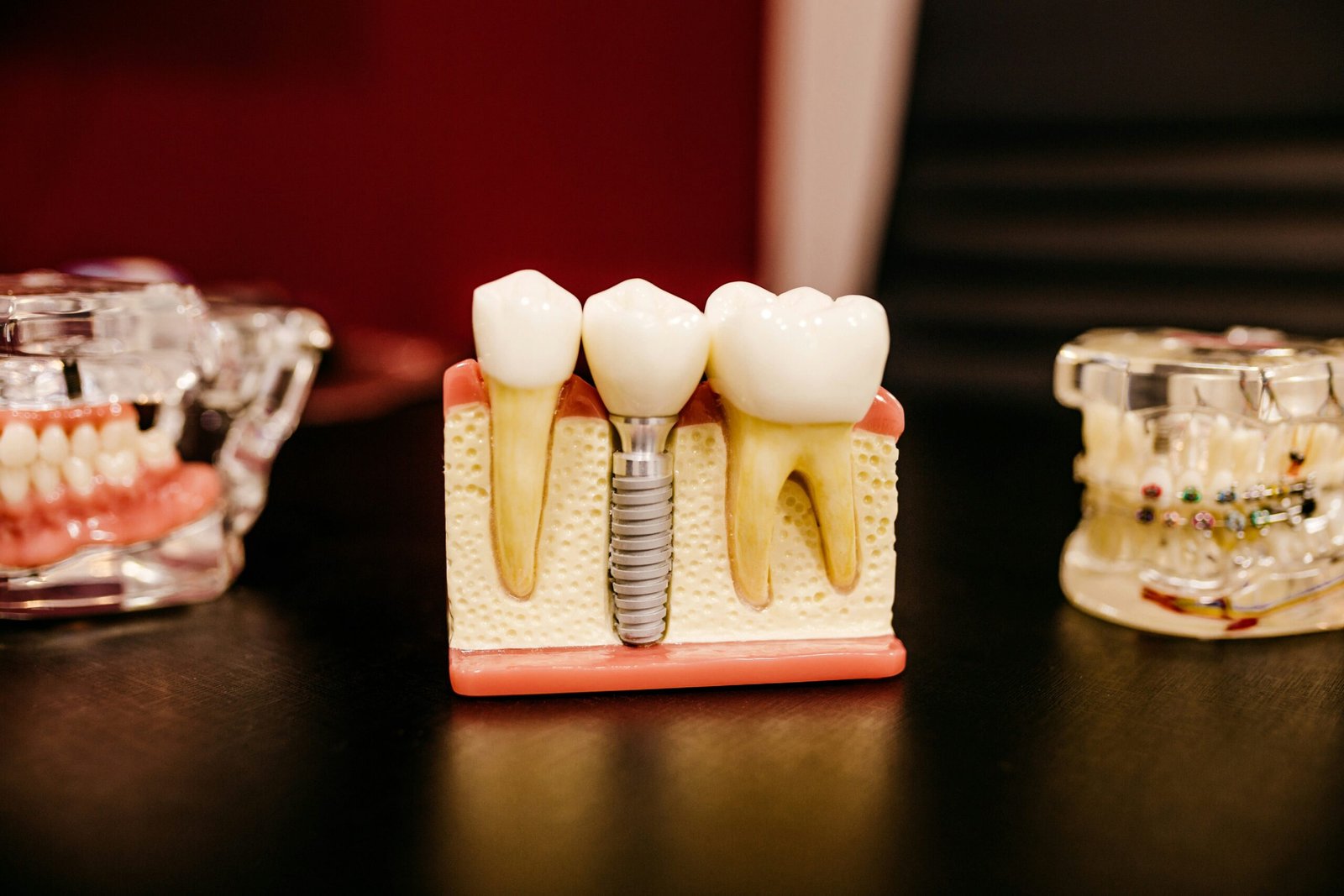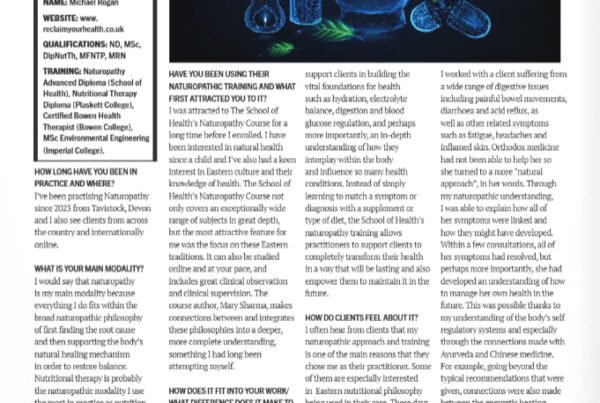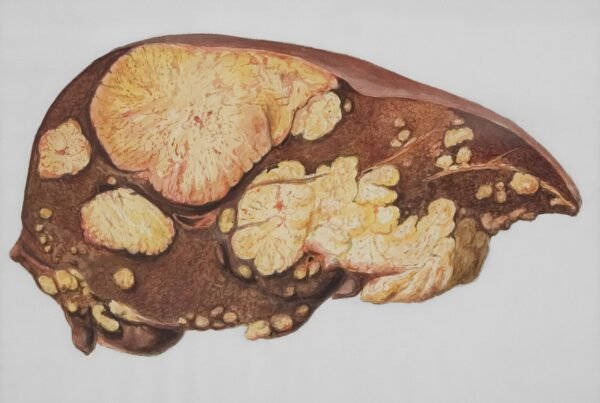It is clear from the study of oral health and dental procedures that they play a fundamentally important role in the health of the entire body. While some of these factors are understood by dentists and well-informed health professionals, the extent and number of ways through which the oral cavity can affect the health of the rest of the body is often overlooked or poorly understood. In this article, I will explore the interconnectedness of oral health and that of the rest of the body further, especially as it relates to stress.
Are you interested in addressing a health issue which may be related to dental work? Or would you like support with this topic for your health? Click here for more information about my consultations.
No matter the orthodox medical diagnosis, it is clear that some form of stress is generally at the root of the issue, whether as a trigger or a more direct cause of the initial imbalance that has lead to the later dysfunction picked up by the medical profession. In the case of the oral cavity, stress can have various implications. I will explore these in detail in the following paragraphs.
Firstly, stress will negatively affect the function of the digestive system, leading to a reduced assimilation of nutrients. This could be understood through the lens of Ayurveda, whereby stress imbalances the Vata dosha which then leads to changes within the gut. If the stress continued or were of a specific type, the Pitta and Kapha doshas might also become imbalanced, which would affect different parts of the digestive system such as the liver and the stomach. Through the eyes of Tibetan medicine, certain emotions and thoughts, such as the three mental poisons of attachment, hatred and delusion, lead to changes in the humours and affect the function of the body. Stress could be linked to any of these, but in many cases it is through attachment to certain ideas or expectations that, when they are not met, stress develops. In Tibetan medicine, this imbalances the Wind humour, which is similar to the Vata dosha, and governs the movement of all nutrients in the body amongst other things. In Western terms, stress may cause the stomach acid and/or the digestive enzymes or bile to reduce or become blocked, thereby directly reducing the ability of the body to digest and assimilate food. The digestive system is always the first part of the body to go out of balance, according to Ayurveda. Thus, less nutrients will reach the parts of the body where they are needed, and more toxins will accumulate, lowering the function of key parts of the body such as the liver, immune and endocrine systems. Less or imbalanced availability of nutrients will reduce the ability of the body to maintain the health of the teeth. The research of Weston A Price and Melvin Page demonstrated how important good nutrition and of course the availability of certain nutrients is to the health of teeth, avoidance of caries and the development of the jaw (Sharma, 2019). Furthermore, if the immune system is not functioning in the optimal way, the ability of the body to prevent or fight off infections in the oral cavity will also be diminished, The effect of the endocrine changes upon the teeth is explained below.
Secondly, prolonged stress can imbalance the endocrine system through the release of stress hormones from the adrenal glands which triggers the release of stored sugar into the blood and subsequently insulin in order to get the sugar out of the blood and into the cells. When this continues for long periods of time, or if there is an inherited predisposition to a weakness in this part of the endocrine system, issues can develop with blood glucose regulation such as hypoglycaemia and later insulin resistance. This can lead to increased sugar intake as the person tries to keep their blood glucose levels steady, which would feed certain pathogenic bacteria and increase the acidity in the oral cavity, increasing the risk of caries through leaching of the minerals in the teeth. It would also lead to high levels of insulin within the blood stream. This hormone would then directly affect other endocrine glands and their secretions, such as the suppression of thyroxine, causing further imbalances in the body including within the immune system. Imbalances of the endocrine system, whether through prolonged stress as noted here, stress causing an imbalance in digestion and reducing nutrient assimilation as mentioned above or just poor dietary choices, was identified by Dr Royal Lee as being the cause of dental decay through a reduction in the ability of the body to fight infections and thus to resist dental decay (Lee Foundation for Nutritional Research).
Thirdly, following on from the changes in the gut mentioned in the first point considered through the lens of Ayurveda, it is now well known in modern science that stress leads to changes in the bacteria present in the gut. Since there is a direct link between the bacteria in the gut and the mouth, it follows that stress could also lead to changes in the bacterial populations living or dominating in the oral cavity. The link between the two is easy to understand when one considers that with each swallow, bacteria from the mouth reach the gut. Modern research has found that there is around a 45% overlap between the bacteria living the gut and the mouth (Segata, 2012). For example, if candida is present within the mouth it is known that it is always active in the gut as well, even if this does not show on stool analysis (Sharma, 2019). When one considers how easily bacteria can change when their environment changes through the process of pleomorphism, it does not take a stretch of the imagination to consider that changes in the emotional state of the person through stress could also directly affect the bacteria present within the oral cavity, not just in the later parts of the digestive system. This could happen through the various molecules released within the body when stress is experienced changing the environment present within the mouth as well as the rest of the body, through changed dietary habits due to the experienced emotional state such as increased snacking, leaving less time between meals so that an acidic state is maintained for longer periods, or a higher intake of sugar in the diet as a reaction to drops in blood glucose levels caused by stress hormones affecting insulin production. Greater amounts of sugar or fermentable carbohydrates in the oral cavity would feed certain types of pathogenic bacteria such as Streptococcus mutans, well known for its role in tooth decay.
Finally, stressful events are understood to act as triggers of a deepening of a condition within the body, whereby the symptoms can begin to affect a new, more serious organ system or part of the body, through Hering’s Law of Cure working in reverse. This may also result in a shift of the miasmic state of a person to a deeper level, for example from Sycotic to Tuberculinic, or in other terms between different stages of Reckeweg’s Six Phase Table such as from Deposition to Impregnation. Such stressful events could include the death of a loved one, the ending of a marriage or loss of a job, or several such events happening within a short time-frame. Such situations can also cause changes in latent infections that were fairly dormant into becoming more serious focal infections which actively affect other parts of the body (Williams, 2012).
When an infection of any kind is present within the oral cavity, this can have significant effects on the rest of the body. If for any reason, including some of those discussed above linked to stress, the body’s immune system is unable or insufficient to contain and fight the infection, bacteria and their toxic bi-products can migrate from the oral cavity to the rest of the body. This situation is often made worse by certain dental procedures such as root canals, where the body’s immune system is not able to access and thus neutralise the source of infection. In the case of any dental procedures where metals are placed in the mouth, the toxic load migrating from the mouth to the rest of the body can also include substances like mercury and nickel. This migration can occur through swallowing the substances directly into the gut, breathing in vapours to the brain and lungs, at which point they can enter the blood stream, or even through the nervous and venous systems to any part of the body. Due to this mechanism of migrating bacteria and their toxins, there have been a huge number of health conditions directly linked to the presence of infections within the oral cavity. These include, but are not limited to: strokes, heart attacks, cancer, diabetes, Alzheimer’s, depression, hypertension and arthritis (Sharma, 2019). Due to the seriousness of the link between dental infections and toxicity and the health of the rest of the body, some holistic dentists believe that up to 90% of chronic disease could be connected to the state of the oral cavity (Sharma, 2019). Through the mechanism of oxidative stress, these toxins place a high load on the immune system and cells throughout the body. Over time, the focal infections or toxin metal accumulations in the mouth can overcome the defences of the body, leading to autoimmune diseases, chronic fatigue and eventually to common causes of death such as strokes, heart disease and cancers.
Are you interested in addressing a health issue which may be related to dental work? Or would you like support with this topic for your health? Click here for more information about my consultations.
In conclusion, it is clear that the health of the oral cavity is paramount to the health of the entire body. Being placed at the start of the digestive system and so close to the brain, it is easy to understand how changes in this part of the body could have a significant impact upon the health of the entire organism. As naturopaths, it is important to have an understanding of the dental health and history of our clients so that these links can be made and any obstacles to cure be found in a timely fashion. Our clients also generally appreciate being made aware of these connections when they are present so that they can better regain control of their own health and maintain it going forwards.
References and further reading
Lee Foundation for Nutritional Research reprint 30A
Segata, N, Haake SK, Mannon P, et al. Composition of the adult digestive tract bacterial microbiome based on seven mouth surfaces, tonsils, throat and stool samples. Genome Biol. 2012;13(6):R42
Sharma, M., 2019, Naturopathy Course Notes, Module 10: Oral Health, School of Health, Stroud, UK
Williams, L., 2011, Radical Medicine, Healing Arts Press, Vermont, USA





